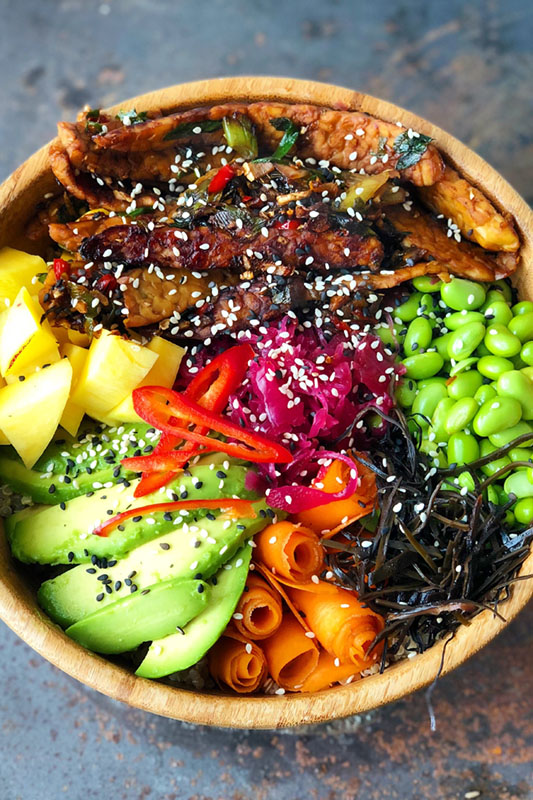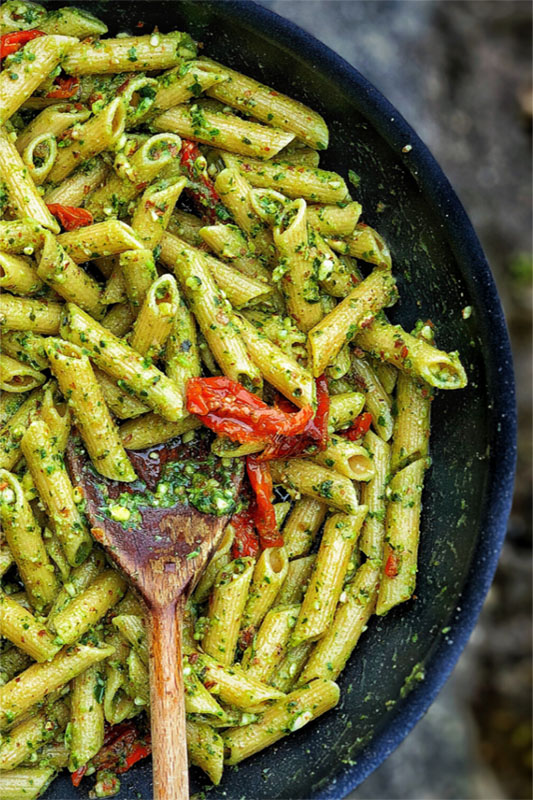10 Reasons To Get Your Protein From Plants

Michelle McMacken, MD
Protein is often equated with meat, eggs, and dairy, but in fact, we can – and science says we should – get the protein we need from legumes, whole grains, vegetables, and other plant-based foods. Here are the top 10 reasons why I recommend we look to plants for our protein needs.
1. Plant protein is the only truly lean (and clean) protein.
Legumes, such as beans, lentils, and chickpeas, are protein powerhouses that contain less than 5% of calories from fat. Compare this to beef, chicken and other animal foods, which even in their leanest forms can contain three or more times as many calories from fat as from protein! Fish also contain unhealthy fats, as well as industrial pollutants. Protein from animal sources brings along with it many noxious and inflammatory compounds: saturated fat, cholesterol, hormones, heme iron, bacteria, feces, advanced glycation endproducts, polychlorinated biphenyls, and in many cases, antibiotics. When you get your protein from plants, you’re sparing yourself of countless nutritional and environmental toxins.
2. Plant protein lowers your risk of obesity and unwanted weight gain.
Large studies confirm that people who follow plant-based diets tend to have the healthiest body weights. Studies also show that meat – including chicken! – is the main food-related cause of weight gain, even for the same calorie intake. Best of all, a plant-based diet can help people shed excess weight without measuring portions or counting calories.
3. Plant protein is anti-inflammatory.
Meat-based diets are linked to chronic inflammation, which can lead to heart disease, diabetes, and other illnesses. Animal products cause inflammation because of their saturated fat, endotoxins (small, toxic fragments of bacteria found in animal foods), heme (animal-based) iron, advanced glycation endproducts, and TMAO, a compound made by gut bacteria when we eat meat, eggs, or cheese. Plant-based diets, on the other hand, are naturally anti-inflammatory. Studies show that your blood markers of inflammation can drop in just a few weeks of shifting to a plant-based diet!
4. Plant protein can prevent erectile dysfunction and other blood vessel problems.
When our blood vessels fill up with cholesterol deposits (atherosclerosis) or constrict in response to inflammatory foods like animal products, our blood doesn’t circulate properly – leading to heart disease, strokes, and yes, erectile problems. Animal products are a primary cause of blood vessel dysfunction. In contrast, plant-based diets not only prevent, but can actually treat blood vessel disease, reducing symptoms within a few days.
5. Plant protein doesn’t cause diabetes.
Animal protein, especially red and processed meat, is one of the most potent triggers for type 2 diabetes, even in very small amounts. This is because animal fat, animal-based iron, and nitrate preservatives in meat impair the way our cells respond to insulin, making us insulin resistant. Favoring plant proteins over animal proteins is a very powerful way to lower your chances of getting type 2 diabetes, and even to treat your diabetes if you already have it.
6. Plant protein doesn’t cause cancer.
The World Health Organization considers processed meats (e.g., bacon, ham, sausage, cold cuts) a group 1 carcinogen (cause cancer) and red meats (e.g., beef, pork, lamb, veal, goat) a group 2 carcinogen (probably cause cancer). These meats are tied most closely to cancers of the colon, pancreas, stomach, and prostate. In fact, all meat, including poultry and fish, release carcinogenic compounds when grilled, barbequed, or otherwise cooked at high temperatures. Animal protein also stimulates our bodies to make IGF1, a hormone that has been linked with cancer cell growth. Plant foods, on the other hand, have powerful antioxidants and other phytonutrients that reduce your risk of cancer.
7. A plant-based diet has the right amount of protein.
Most people in the developed world eat far too much protein. In the U.S., for example, the average American adult eats more than 1.5 times the recommended daily allowance of protein. This excess protein does not make us strong and lean. Instead, it is simply stored as fat or turned into waste, and if it is from animal sources, it tends to increase our risk of disease. A plant-based diet can supply more than enough protein for us to thrive, without the many risks of animal protein. As long as your diet is based on a variety of plant foods including legumes, you’ll have no problem meeting protein needs without animal foods.
8. Plant protein might help you live longer.
A recent major medical study, in which more than 130,000 people were followed for over 26 years, found that replacing animal protein with plant protein decreased the risk of early death. This was true for all types of animal protein studied: processed & unprocessed red meat, poultry, fish, eggs, & dairy. Amazingly, using 3% of energy from plant protein to replace the equivalent amount of animal protein lowered death rates by 34% for processed red meat, 19% for eggs, 12% for unprocessed red meat, 8% for dairy, and 6% for poultry & fish.
9. Plant protein reduces animal suffering.
Animals raised for food endure extreme confinement, physical mutilation, and psychological distress. Even in non-factory-farm settings, animals are ultimately slaughtered, including dairy cows and egg-laying hens – many while still conscious. Choosing a plant-based diet is a powerful way to live a more compassionate life.
10. Plant protein is better for the planet.
Animal agriculture is a leading cause of greenhouse gas emissions, land and water use, deforestation, and wildlife destruction, and it contributes significantly to world hunger. Here’s the reality: what you choose to put on your plate can make a dramatic difference not just in your personal health, but the health of the entire planet.













